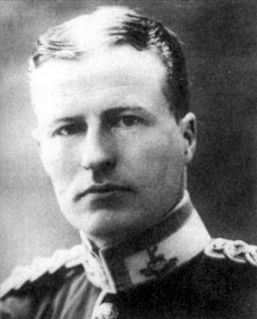 W
WEllis Ashmead-Bartlett was an English war correspondent during the First World War. Through his reporting of the Battle of Gallipoli, Ashmead-Bartlett was instrumental in the birth of the Anzac legend which still dominates military history in Australia and New Zealand. Through his outspoken criticism of the conduct of the campaign, he was instrumental in bringing about the dismissal of the British commander-in-chief, Sir Ian Hamilton – an event that led to the evacuation of British forces from the Gallipoli peninsula.
 W
WHerbert Henry Asquith, 1st Earl of Oxford and Asquith,, generally known as H. H. Asquith, was a British statesman and Liberal politician who served as Prime Minister of the United Kingdom from 1908 to 1916. He was the last prime minister to command a majority Liberal government, and he played a major role in the design and passage of major liberal legislation and a reduction of the power of the House of Lords. In August 1914, Asquith took Great Britain and the British Empire into the First World War. During 1915, his government was vigorously attacked for a shortage of munitions and the failure of the Gallipoli Campaign. He formed a coalition government with other parties but failed to satisfy critics and was forced to resign in December 1916, and never regained power.
 W
WDame Ethel Hope Becher was a British nurse who served as the War Office matron-in-chief of the Queen Alexandra's Royal Army Nursing Corps from 1910 to 1919, including World War I.
 W
WEvelyn Fürstin Blücher von Wahlstatt, diarist and memoirist, wrote a standard account of life as a civilian aristocrat in Germany during World War I.
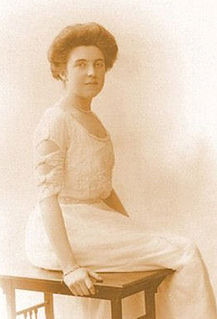 W
WElsie Edith Bowerman was a British lawyer, suffragette, political activist, and RMS Titanic survivor.
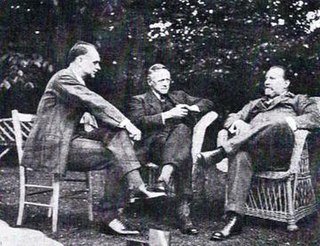 W
WThomas Edward Clark was an English conductor and music producer for the BBC. Through his positions in leading new music organizations and his wide-ranging contacts with British and European composers, he had a major impact on making contemporary classical music available to the British public for over 30 years. He was a leading figure in the BBC's Concerts of Contemporary Music between 1926 and 1939, and he played a significant role in the founding and early development of the BBC Symphony Orchestra. He held prominent positions in the International Society for Contemporary Music (ISCM) from its inception in 1922, and was its president from 1947 to 1952.
 W
WThe Diamond Troupe was the concert party of the 29th Division, a First World War infantry division within the British Army. Also known as the "Incomparable Division", the 29th was formed in 1915 by combining units that had previously been acting as garrisons about the British Empire. The division fought throughout the Gallipoli Campaign and, from 1916 to the end of the war, on the Western Front in France.
 W
WVictor Alexander Sereld Hay, 21st Earl of Erroll and 4th Baron Kilmarnock, KCMG, styled Lord Hay from 1876 to 1891 and Lord Kilmarnock from 1891 to 1927, was a British diplomat, a writer and briefly a member of the House of Lords, who was "noted for his tact and charm."
 W
WSir James Alfred Ewing MInstitCE was a Scottish physicist and engineer, best known for his work on the magnetic properties of metals and, in particular, for his discovery of, and coinage of the word, hysteresis.
 W
WJohn Arbuthnot Fisher, 1st Baron Fisher,, commonly known as Jacky or Jackie Fisher, was a British Admiral of the Fleet known for his efforts at naval reform. He had a huge influence on the Royal Navy in a career spanning more than 60 years, starting in a navy of wooden sailing ships armed with muzzle-loading cannon and ending in one of steel-hulled battlecruisers, submarines and the first aircraft carriers.
 W
WEdward Morgan Forster was an English fiction writer, essayist and librettist. Many of his novels examine class difference and hypocrisy, including A Room with a View (1908), Howards End (1910) and A Passage to India (1924). The last brought him his greatest success. He was nominated for the Nobel Prize in Literature in 16 separate years.
 W
WL. J. Greenberg, born Leopold Jacob Greenberg (1861–1931), was a British journalist. He had become an energetic propagandist of the new Zionism in England by the Third Zionist Congress in 1899, at which he and Jacob de Haas were elected as members of the ZO's Propaganda Committee. His frequent dialectical debates were conducted as editor of The Jewish Chronicle, the leading paper in Britain for the Jewish community. Greenberg called for decency and humanity towards World Jewry.
 W
WFrank Arthur "Bones" Jenner was an Australian evangelist. His signature approach to evangelism was to ask people on George Street, Sydney, "If you died within 24 hours, where would you be in eternity? Heaven or hell?" Born and raised in England, he contracted African trypanosomiasis at the age of twelve and suffered from narcolepsy for the rest of his life. After some time, he joined the Royal Navy, but deserted in New York and joined the United States Navy. When he was 24, he deserted again while in Australia. He subsequently worked for the Royal Australian Navy until he bought his way out in 1937.
 W
WLeonard Maurice Keysor, VC was a British-born Australian recipient of the Victoria Cross, the highest award for gallantry "in the face of the enemy" that can be awarded to British and Commonwealth forces. Born in England, Keysor emigrated to Australia shortly before the outbreak of the First World War. He enlisted in the First Australian Imperial Force in August 1914 and served in Egypt before landing at Gallipoli, Turkey at the beginning of the campaign. On 7 August 1915 at Lone Pine, while serving as an acting lance-corporal, 29-year-old Keysor performed an act of bravery for which he was awarded the Victoria Cross. Later in the war he took part in the fighting in France, serving in the trenches along the Western Front. He would later achieve the rank of lieutenant before being discharged from the army on medical grounds at the end of the war.
 W
WSir John Lavery was an Irish painter best known for his portraits and wartime depictions.
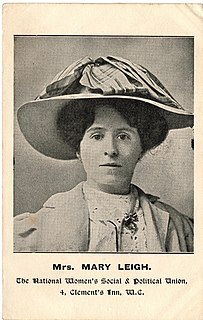 W
WMary Leigh was an English political activist and suffragette.
 W
WLilian Ida Lenton was an English dancer, suffragist, and winner of a French Red Cross medal for her service as an Orderly in World War I.
 W
WDavid Lloyd George, 1st Earl Lloyd-George of Dwyfor, was a Welsh statesman and Liberal Party politician who served as Prime Minister of the United Kingdom from 1916 to 1922. He was the final Liberal to hold the post of prime minister, but his support increasingly came from the Conservatives who finally dropped him.
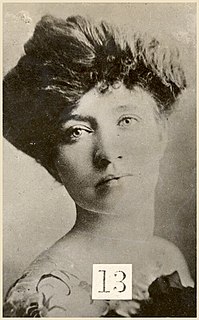 W
WKitty Marion was born Katherina Maria Schäfer in Germany. She immigrated to London in 1886 when she was fifteen, and she grew to minor prominence when she sang in music halls throughout the United Kingdom during the late 19th century. She became known in the field for standing up for female performers against agents, corruption, and for better working conditions. She joined the Women's Social and Political Union (WSPU) in 1908, engaged in selling their newspaper Votes for Women and became a prominent suffragette in the United Kingdom for her participation in civil unrest protests including riots and arson. As a result, Marion was arrested many times and is known for having endured 232 force-feedings while on hunger strike in prison. She is quoted as saying “there are no words to describe the horrible revolting sensation.” When World War I started she emigrated to the United States, and there she joined the team on Margaret Sanger’s Birth Control Review. Although she used her tenacity and loud voice to get people to pay attention to her cause, she did not use violence as much as she had in the United Kingdom, although she was still arrested many times for advocating birth control.
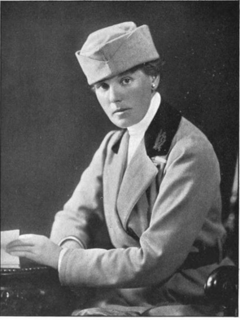 W
WDame Anne Louise McIlroy, known as Louise McIlroy, was a distinguished and honoured Irish-born British physician, specialising in obstetrics and gynaecology. She was both the first woman to be awarded a Doctor of Medicine (MD) degree and to register as a research student at the University of Glasgow. She was also the first woman medical professor in the United Kingdom.
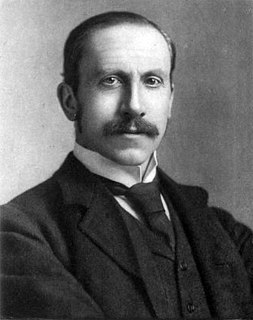 W
WAlfred Milner, 1st Viscount Milner, was an English statesman and colonial administrator who played a role in the formulation of British foreign and domestic policy between the mid-1890s and early 1920s. From December 1916 to November 1918, he was one of the most important members of Prime Minister David Lloyd George's War Cabinet.
 W
WAdmiral of the Fleet Sir Henry Francis Oliver, was a Royal Navy officer. After serving in the Second Boer War as a navigating officer in a cruiser on the Cape of Good Hope and West Coast of Africa Station, he became the first commanding officer of the new navigation school Mercury in the early years of the 20th century. He went to be commanding officer first of the armoured cruiser Achilles and then of the new battleship Thunderer before becoming Director of the Intelligence Division at the Admiralty.
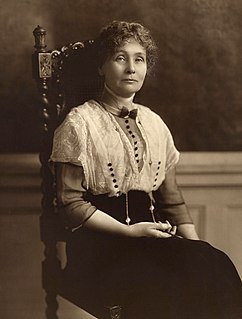 W
WEmmeline Pankhurst was a British political activist. She is best remembered for organizing the UK suffragette movement and helping women win the right to vote. In 1999, Time named her as one of the 100 Most Important People of the 20th Century, stating that "she shaped an idea of objects for our time" and "shook society into a new pattern from which there could be no going back". She was widely criticised for her militant tactics, and historians disagree about their effectiveness, but her work is recognised as a crucial element in achieving women's suffrage in the United Kingdom.
 W
WAllan Pollock was an English actor. In the United States, he was known for stage appearances in Hawthorne of the U.S.A. (1912) and A Bill of Divorcement (1921). He joined the British armed forces in World War I in 1914, two days after war was declared, and rose to the rank of captain. In 1916 he was seriously wounded in the Ypres Salient and recovered in hospitals for more than three years and had eleven operations.
 W
WAlmeric Hugh Paget, 1st Baron Queenborough, GBE was a British industrialist and Conservative Party politician. He was a founder of the Military Massage Service and the Cambridgeshire Battalion of The Suffolk Regiment and treasurer of the League of Nations Union.
 W
WSeymour de Ricci (1881-1942) was a bibliographer and historian, who was born in England and raised and became a citizen of France.
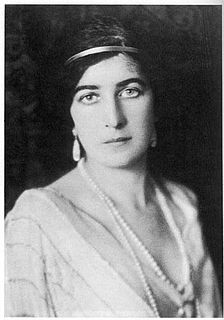 W
WBeatrice Venetia Stanley Montagu was a British aristocrat and socialite best known for the many letters that Prime Minister H. H. Asquith wrote to her between 1910 and 1915.
 W
WSir Frederick Wilfrid Scott Stokes, was the inventor in 1915 of the Stokes Mortar, which saw extensive use in the latter half of the First World War and was one of the first truly portable mortars.
 W
WHerbert Samuel Thomas was a British political cartoonist contributing to Punch magazine and the creator of well-known British propaganda posters during the First and Second World Wars.
 W
WMaud Edith Eleanor Watson, MBE was a British professional tennis player and the first female Wimbledon champion.
 W
WSidney Frederick Wicks was a Congregational minister, public speaking trainer, advertising and business manager, and newspaper executive. He conducted public speaking courses and formed what is now the oldest public speaking club in the world initially called The Rostrum but now simply Rostrum.
 W
WFrancis Derwent Wood was a British sculptor.